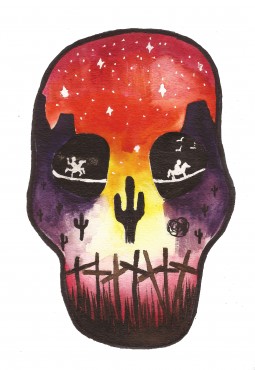One way to judge the merits of a novel is by its shelf life. For example, Herman Melville’s seminal Moby Dick was a commercial and critical flop during the author’s life. He never saw it become as large as its titular namesake.
Entering its third decade, Cormac McCarthy’s challenging, nightmare-inducing and revealing novel Blood Meridian has avoided this fate. Judge Holden, the novel’s devilish antagonist, certainly resembles Moby Dick’s monomaniacal Captain Ahab, as Yale Professor Amy Hungerford points out in her Yale Open Courses lectures on the violent novel [at about 9:50 in the linked video – Ed.].
And violent is an understatement as the reader follows the sadistic journeys of “the Kid.” Don’t let his name fool you: he is as much a part of the indiscriminate bloodletting and scalp hunting as the men surrounding him. Readers learn immediately that the 14-year-old nameless protagonist “can neither read nor write and in him broods already a taste for mindless violence.”
University of Victoria Professor of English Christopher Douglas, a specialist in contemporary American fiction, researches religion in Meridian: “I approach the novel by looking at the religious questions it raises — in particular, about God’s design in nature and the question of his goodness.”
“Blood Meridian doesn’t suggest that we should be worried because God is dead; it suggests that we should be worried because God isn’t dead. The novel imagines that the evil that humans do is part of God’s dark design, as seen in natural selection.”
Douglas explains that “[w]hat makes the novel so disturbing is the way McCarthy uses beautiful, almost biblical, prose to narrate scenes of almost indescribable violence and cruelty . . . It’s a deeply philosophical, even religiously-inflected novel, one that seems to suggest that violence is at the heart of American national identity.”
Pick up Blood Meridian and you will cross a threshold into a literary world like no other. Although McCarthy’s beautiful esoteric prose takes getting used to, his esthetic is unrivalled and the vocabulary is that of a well-read wordsmith. One of my copy’s marked up passages displays these qualities while also highlighting the philosophical journey the reader undertakes. McCarthy writes (and notice the syntactic/punctuational style): “The good book says that he that lives by the sword shall perish by the sword, said the black. The judge smiled, his face shining with grease. What right man would have it any other way? . . . It makes no difference what men think of war, said the judge. War endures. As well ask men what they think of stone. War was always here. Before man was, war waited for him. The ultimate trade awaiting its ultimate practitioner.”
Meridian had a slow start like Moby Dick — David Foster Wallace named it one of “five direly underappreciated U.S. novels” since 1960 — but McCarthy has lived to see it jostle for the title of the Great American Novel. The prominent and picky Harold Bloom even sings its praises. Furthermore, the author’s stature flourished when he won the Pulitzer Prize in 2007 for The Road, but more important for sales was its landing on Oprah’s Book Club (which led McCarthy — famous for a Pynchonesque reclusiveness — to grant Oprah an interview). It’s post-apocalyptic and depressing, but unlike Blood Meridian, there are redemptive elements in The Road (after all, it became a big film. Blood Meridian will never do that. Douglas pointed out to me that, aside from the violence, the novel is seen as unfilmable “because of the difficulty in casting the key character of the judge.” My only suggestion was Daniel Day-Lewis). This makes The Road more accessible, but the fact that Blood Meridian is set in the past and not the future heightens its fearsomeness — and I argue, its literary merit.
After looking back at this literary achievement, we can also look forward to more. Newsweek recently reported that McCarthy’s upcoming 2016 work, The Passenger, has “topics ranging from the aesthetics of mathematical equations to the nature of knowledge.”
The true verdict on McCarthy’s oeuvre will be solidified in the coming decades, perhaps after The Passenger’s 30th anniversary. Personally, I think his corpus will enter and survive in the canon long after that, and its longevity will be attributed to the unfathomable lessons it teaches us about ourselves.







